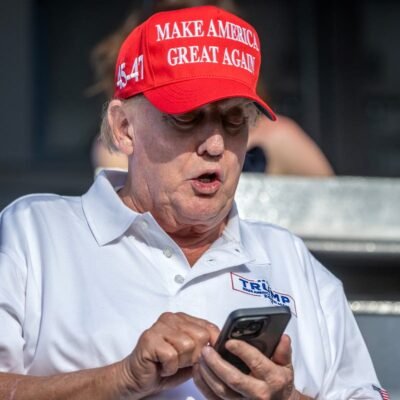Donald Trump is charged in two criminal cases for his alleged attempts to overturn 2020 presidential election results, relying on pressure campaigns and baseless legal challenges to cling on to power after losing to President Joe Biden.
But his upcoming trial on charges connected to a so-called hush-money scheme to bury politically compromising stories of his alleged affairs is also an election interference case, one that stems from his efforts to win the White House in 2016 by any means, according to prosecutors and legal experts.
The trial, which is scheduled to begin on 15 April, serves as a “precursor” to his 2020 cases, all of which involve Mr Trump “deceiving voters to grasp power,” according to Norm Eisen, former special counsel to the House Judiciary Committee majority during Mr Trump’s first impeachment.
And it’s one that could land him in jail.
“Some might think this is a no-jail crime … but when you have falsification of business records associated with or intended to aid, conceal or commit serious crimes, that receives sentences of jail time regularly,” Mr Eisen told reporters on Thursday. “And this is the most serious falsifying business records case … that New York has ever seen.”
The former president is charged with 34 counts of falsifying business records, which on their own are considered misdemeanours. But those charges are elevated to Class E felony crimes if they’re attached to a wider criminal scheme, which in Mr Trump’s case could include alleged violations of state and federal election laws.
Class E felony convictions in New York could include state prison sentences of one to four years.
Mr Trump’s lack of prior convictions, his unpredictable behaviour in and out of court, and whether jurors can be convinced of the prosecution’s arguments will inform whether he sees any jail time.
In this case, prosecutors allege that then-candidate Trump feared another politically damaging scandal after the release of the 2005 Access Hollywood tape one month before Election Day in 2016.
Stories about his alleged affairs “could have sunk Trump’s campaign,” Mr Eisen told reporters on Thursday.
Mr Trump is accused of hatching a “catch and kill” plot with tabloid publishers and his then-attorney Michael Cohen to buy up the rights to stories that would never be published in an attempt to keep them away from voters. Mr Trump then allegedly reimbursed his attorney for making such payments to adult film star Stormy Daniels, with whom he is accused of having an affair, then falsely documented those payments as “legal expenses”.
Manhattan prosecutors are hoping to explain to jurors that the Access Hollywood tape’s release sparked “panic” within his campaign, underscoring the urgency to bury any other stories that would damage his election prospects.
In a December radio interview, Manhattan District Attorney Alvin Bragg emphasized that the case is not about “money for sex.”
“We would say it’s about conspiring to corrupt a presidential election,” he said, “and then lying in New York business records to cover it up.”
In his description of the case to prospective jurors, New York Justice Juan Merchan also makes clear that the case involves an “unlawful” attempt to affect the outcome of the 2016 election.
He writes that Mr Trump is accused of falsifying business records “to conceal an agreement with others to unlawfully influence the 2016 presidential election.”
“Specifically, it is alleged that Donald Trump made or caused false business records to hide the true nature of payments made to Michael Cohen, by characterizing them as payment for legal services rendered pursuant to a retainer agreement,” according to the judge’s summary.
Mr Trump, whose 2024 campaign’s platform builds on a narrative that he is a victim of political persecution, has accused prosecutors of leading a politically motivated investigation to damage his re-election chances.
But “this is a case that was of course brought long ago … because of the importance and significance of the scheme … to unlawfully influence the 2016 election,” according to former US attorney Mary McCord.
“The notion that this is something new or out of the blue should be debunked immediately,” said criminal defence attorney Joey Jackson, a former assistant district attorney in Manhattan. “Manhattan has always flexed its muscles as it relates to business records – it’s perfectly appropriate.”
Mr Bragg has also stressed that similar financial crimes are the bread and butter of his office. Manhattan prosecutors brought similar charges in more than 400 cases within the decade before Mr Trump’s indictment, according to court documents.
Falsifying records was the top charge in at least 42 of those cases.
Last year, Mr Bragg’s office successfully convicted two men who falsified business records as part of an $18m insurance scam.
Legal experts and prosecutors have argued that a plain reading of the evidence of the case, which they claim testimony will prove, will spell out the facts of the case that prove the top charge against the former president.
But the wider challenge will be proving to jurors that the “intent is proven beyond a reasonable doubt,” according to Mr Eisen. Prosecutors would need to show jurors that Mr Trump relied on his “catch and kill” arrangement to keep stories of his affairs away from the voting public to retain his chances of winning the general election in 2016.
“Donald Trump is unlikely to testify and even if he did … he would be unlikely to concede on that,” Mr Eisen said. “I think the proof is powerful, that the criminal intent, the fraudulent intent, the intent to commit federal and state election crimes – I think all of those forms of mens rea, Trump’s state of mind, are amply established by the evidence.”





